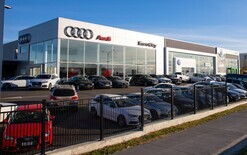Consumers growing ‘wary’ of BEVs

The chief executive of the Motor Industry Association (MIA) has warned it is a difficult time for battery electric vehicles (BEVs) as consumer demand drops off and people appear hesitant about choosing zero-emissions models.
Aimee Wiley says the axeing of the clean car discount being at the end of 2023 and the looming introduction of road user charges for light EVs are just some of the challenges for the industry.
She told RNZ’s Nine To Noon some people who currently drive an EV and are considering changing their vehicle also appear to be hesitant about purchasing another car that relies on battery power.
“Range anxiety is a lot less than it was before but now people who own [an EV] and have owned one for a couple of years are coming to the time where they're going to trade them in and they’re thinking about their next purchase,” explains Wiley, pictured.
“It's about does it stack up? Is it what the consumer can afford right now? Is it what they want? I think in terms of stimulating sales of electric vehicles, the consumers need to want to buy one.”
The automotive market is seeing motorists who bought from the first broad offering of EVs, which Wiley says excludes the likes of the earlier Nissan Leafs, starting to consider trading them in.
Wiley told RNZ this signals the start of a new used market but some consumers are uncertain about what to do.
“People are trying to figure out their way forward, what is [their EV] worth? Who wants to buy it? What's the battery health like? It's a new time … people are wary,” she says.
“I think we need to explain why it's important for us to transition to lower-emission vehicles and we've got to make it financially viable and there are some considerable challenges associated with that.”
Wiley says new vehicle sales are down overall and demand for BEVs has fallen by about 80 per cent at the start of this year when compared with the same period of 2023.
“It's a difficult time for vehicles and it's a difficult time for EVs. Interest rates have certainly contributed to weaker demand for vehicles but with the removal of the clean car discount and the introduction of road user charges people are hesitant around electric vehicles.
“We're still seeing strong demand for hybrids and that makes sense because consumers have got the comfort of knowing it’s got a traditional petrol engine … it’s a lower emission choice it’s just not the lowest emission choice.”
To hear Wiley’s full interview, click here.





